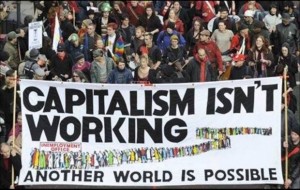The Unemployment Conspiracy
Real unemployment in the U.S. today hovers around 8.3%, afflicting more than 17 million people. This is roughly equivalent to the combined populations of New York City, Los Angeles, Chicago and Houston. Over one third of the working age population has given up looking for work. On top of this, pundits project that many more jobs will be lost to automation in the near future, with computers and robots replacing as many as 49% of the jobs now done by humans. The mechanization of dirty, dangerous, repetitive, mind-numbing tasks should be a blessing. Instead, the future is described in apocalyptic terms. Why? The problem is rooted in the disingenuous narrative we are fed. Jobs, so the story goes, are mysterious, ephemeral things, whose comings and goings are largely beyond our control.












